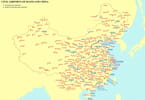The outbreak of E. coli infections in Germany and 11 other countries have continued to spread, with more than 2,260 cases in total, including 22 deaths, reported, the United Nations World Health Organization (WHO) said in its latest update on the situation.
Many of those infected with the enterohaemorrhagic E. coli (EHEC) bacteria have developed haemolytic uraemic syndrome (HUS), which can be fatal, WHO said yesterday.
As of yesterday, Germany has reported 1,536 cases of EHEC infection (without HUS), including six deaths, an increase of 108 from the previous day. The number of HUS cases rose by 54 over the previous day to 627, including 15 fatalities, according to WHO.
Eleven other European countries – Austria, the Czech Republic, Denmark, France, Netherlands, Norway, Poland, Spain, Sweden, Switzerland and the United Kingdom – reported a total of 31 HUS cases, including one death, and 71 cases of EHEC.
In the United States, the Centers for Disease Control and Prevention, had earlier reported two cases of HUS, both linked to the outbreak in outbreak in Europe through travel.
WHO conformed last week that the current spread of E. coli infections in Europe is the result of a rare strain of the bacterium.
EHEC is a severe strain of E. coli bacterium that is commonly found in the gut of animals, mainly ruminants. It produces toxins, known as Shigatoxins or verotoxins, which damage blood cells and the kidneys, according to WHO.
Symptoms include abdominal cramps and diarrhoea, which may be bloody. Fever and vomiting may also occur.
Most patients recover within 10 days, although in a few cases, especially among young children and the elderly, the infection may lead to a life-threatening disease, such as HUS, which can lead to acute kidney failure, haemolytic anaemia and a low platelet count.
WHAT TO TAKE AWAY FROM THIS ARTICLE:
- Most patients recover within 10 days, although in a few cases, especially among young children and the elderly, the infection may lead to a life-threatening disease, such as HUS, which can lead to acute kidney failure, haemolytic anaemia and a low platelet count.
- In the United States, the Centers for Disease Control and Prevention, had earlier reported two cases of HUS, both linked to the outbreak in outbreak in Europe through travel.
- coli infections in Germany and 11 other countries have continued to spread, with more than 2,260 cases in total, including 22 deaths, reported, the United Nations World Health Organization (WHO) said in its latest update on the situation.






















